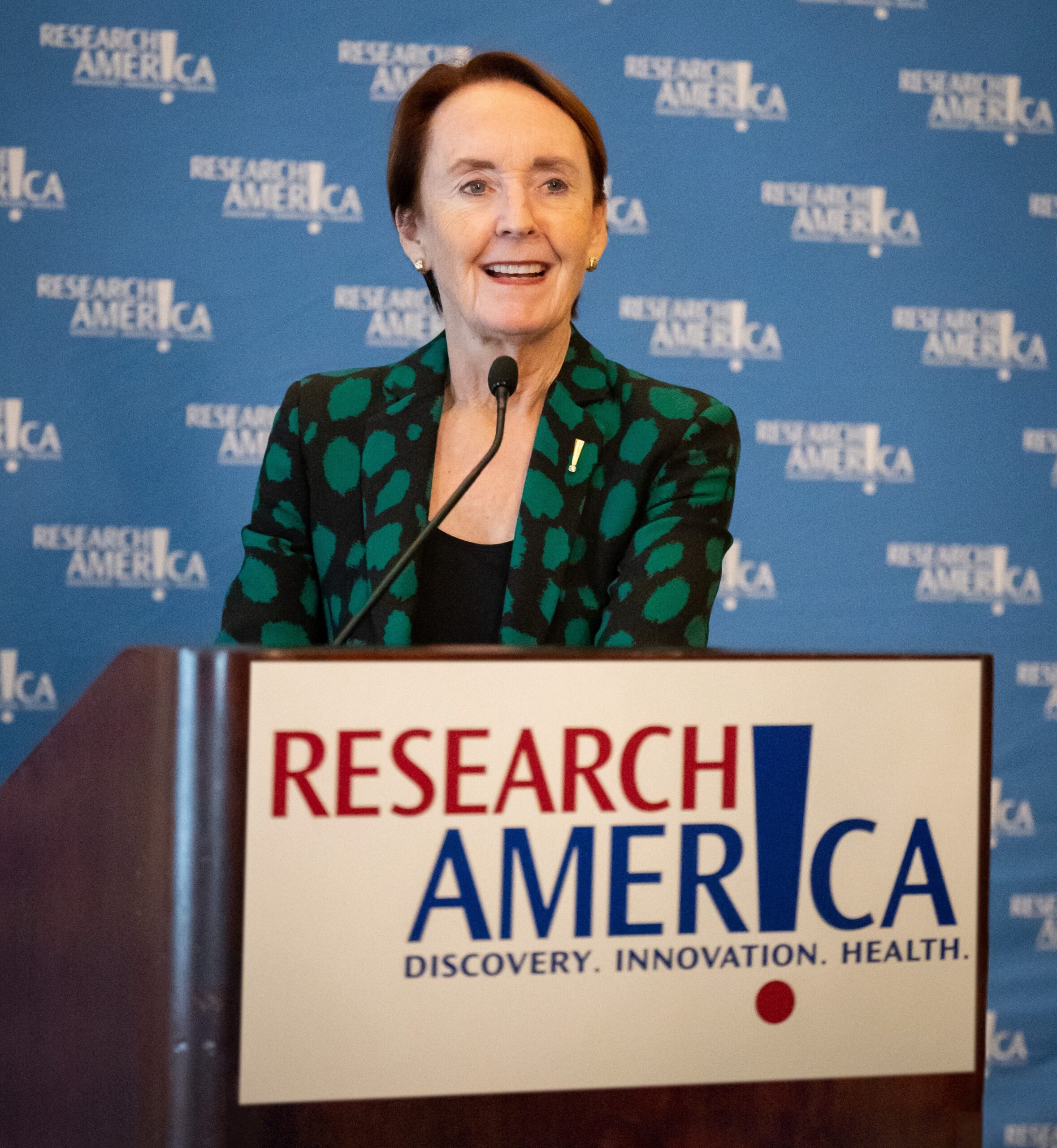From Public Sentiment to Public Policy

Research!America’s latest Poll Data Summary presents an important snapshot of public perceptions and priorities across a range of research-relevant issues. Generously supported by the American Medical Association, this 24th edition shows that the American people want and expect their representatives (and candidates!) to promote faster medical progress, and that the public understands the significant benefits science and technology deliver.
But not all the news is good. For example, public trust in science continues to wane. A particularly alarming revelation is that more than half of Americans believe children will be worse off in the future than now, a finding that should give us all pause.
Among respondents who say children will be “better off,” 81% cite advances in science and technology as the reason why. That’s encouraging, but those advances won’t happen by themselves.
Enabling scientists to turn public aspiration into reality is a commitment that advocates can deliver on. I encourage you to make use of our survey data in your advocacy – for example, call attention to the fact that 84% of Americans think it’s important for candidates to promote faster medical progress; urge candidates to champion investment in that progress. We know from 30 years of commissioning national surveys that policymakers respond to public sentiment (as they should!).
On The Hill: Senators face early-to-mid-May deadlines for submitting their FY25 funding priorities to various Senate appropriations subcommittees, with a deadline of May 14 for submitting their Labor-HHS Subcommittee priorities. As you’ll recall, this is the subcommittee responsible for allocating funding to NIH, CDC, BARDA, and AHRQ (see the full list of agencies and programs under the subcommittee’s purview). Have you had an opportunity to weigh in with your Senators as they finalize their appropriations priorities? Use our funding request resource to do just that.
“Dear Colleague” Advocacy Opportunities: Another way you can help ensure research agencies receive priority in federal funding decisions for FY25: Encourage your representatives in the House and Senate to sign on to “Dear Colleague” letters (member-to-member outreach) promoting research-relevant appropriations priorities. Currently there are separate Dear Colleague letters circulating in both the House and Senate urging appropriators to prioritize NIH and NSF funding. To give you as much flexibility as possible in your advocacy, we have created four separate resources you can use to encourage members of your Congressional delegation to sign the Dear Colleague letters. Simply follow the links below:
- Ask your Senators to sign on to the NIH letter before the May 8 deadline for signatures, and to sign on to the NSF letter before the May 2 deadline for signatures.
- Ask your Representative in the House to sign on to the NIH letter before the May 1 deadline for signatures, and to sign on to the NSF letter before the April 29 deadline for signatures.
ARPA-H Sign-on Letter: As I mentioned in last week’s letter, an informal group of organizations from across the medical and health research ecosystem is circulating an organizational sign-on letter calling for an increase of $200 million in ARPA-H’s budget for FY25. The agency’s current budget is $1.5 billion. The deadline for signing this letter is 12 PM ET on Wednesday, May 1. Read the letter and sign your organization on. For a quick glance at the projects ARPA-H is funding, see our updated tracker. As always, don’t hesitate to reach out to Erin Darbouze with questions.
World Malaria Day: Did you know that over half of the world’s population is at risk for malaria infection? April 25 is World Malaria Day, raising awareness about the tragic toll of this global disease threat. While malaria was officially eradicated in the U.S. more than 70 years ago, CDC reports approximately 2,000 travel-related cases of malaria in the U.S. each year. It’s especially concerning that recently, “locally-acquired” cases have also been reported (in Arkansas, Texas, Florida, and Maryland). On this #WorldMalariaDay, take a look at our updated fact sheet, view CDC’s important role in Malaria prevention, detection, and control, and join the conversation on social media.
Congressional Life Science Fair: The Coalition for the Life Sciences (CLS) and the Federation of Americans Societies for Experimental Biology (FASEB) are inviting Research!America alliance members to participate in the Life Science Fair, to be held on June 10, from 5 p.m. to 7 p.m. in rooms 2043 and 2044 of the U.S. House Rayburn Building. It’s a great opportunity for the biomedical research community to engage members of Congress and their staff on avenues to accelerate scientific progress to advance public health. Admission is free and it’s not necessary to be a member of either CLS or FASEB to participate. If interested, please contact either Lynn Marquis or Ellen Kuo.
Inflation Reduction Act (IRA) Implementation: If you are with a Research!America alliance member organization, join us on April 30 at noon ET for an off-the-record discussion with Nick Bath and Adam Finkelstein from Manatt, Phelps & Phillips. We’ve asked Nick and Adam to provide an update on the implementation of the Medicare drug price negotiation provisions of the IRA. Regardless of one’s views on these highly charged provisions, there is no doubt that decisions being made now will affect the entire health and research ecosystem going forward. If you are an alliance member, email Jacqueline Lagoy to register.
Closing the Gender Gap in Research: In a well-attended alliance discussion earlier today focused on women’s health, Research!America’s Jenny Luray had a frank conversation with leaders of two of our alliance member organizations, Katie Schubert, President and CEO of the Society for Women’s Health Research, and Lori Frank, President of Women’s Health Access Matters. From underrepresentation in research to misdiagnosis and treatment gaps in health care settings, disparities are placing women at risk. Take a moment to watch this important discussion.




